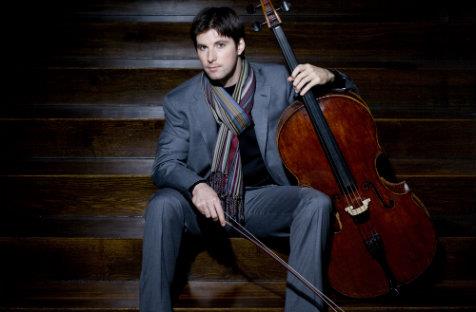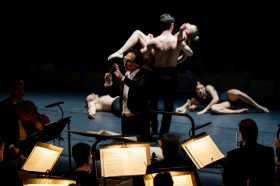It’s very rare, I think, that a piece of music is stopped prematurely. Or rather, dear reader, I’ve yet to see (and hear) such a sonic halt happen, yet to see (and hear) an orchestra come to an impromptu discontinuation, yet to see (and hear) the music, in a word, die. Yes, on occasion, at a concert of a jazz singer’s – or something of that ilk that’s a bit less classical – a song might have a false start, with the singer adding a suitable bit of patter to mitigate the gaffe. (‘Which one, Geoff?’ they might say, cultivating a sort of lackadaisical yet ready-for-everything genius. ‘Oh, right. Sorry, folks – they tell me what to do and sometimes I don’t keep up with them.’) But this was nothing like that, for it was the Australian Chamber Orchestra, no less.
Well, not the Australian Chamber Orchestra proper, but its second orchestra ACO2 – an initiative of the ACO to ensure the quality of music throughout the years to come. (It is, basically, an orchestra filled with young people, but with a few strategically placed members of ACO in principal positions. This concert tour was their mainstage premiere.) Principal cellist of the ACO, Timo-Veikko Valve, was also principal cellist (as well as one-time soloist) for this evening performance in the City Recital Hall, and it was he that stopped the music.
The piece? Stravinsky’s Concerto in D major, a surprisingly energetic affair that was midway through the first of its three movements when, being distracted, from watching the other side of the stage, by a larger movement than one would reasonably expect from the cello section, I saw Valve and his younger neighbour swapping their instruments. A second or two later, she with the second-hand cello rose from her seat and walked off the stage with cello in tow. A string must have broken, it seemed – something that happens every now and then. But the music never stops. Then, ten seconds after that, Valve was required to really go at his new instrument, and either the sound that emerged from it was unsatisfactory, or another string broke, or something else happened that escaped me, and the music petered out – Valve was up and off the stage, leaving one cello and an orchestra waiting patiently until he returned. Musicians were made comfortable once more, the piece was continued (from a few bars back), and the concert went on without another hitch. Life is often at its most interesting when things don’t go to plan.
Also unusual was Richard Tognetti speaking with a microphone for about ten minutes at the start, telling of the origin of the orchestra, letting the players speak for themselves, and introducing the pieces. What wasn’t unusual, however, was the quality of the music, for while the players might be different, until Richard Tognetti’s bow they managed a pretty good imitation of what it is that we value in the ACO itself.
We began with Rautavaara’s The Fiddlers, a piece that calls upon many members of the ensemble to act as soloists at points, and each member given the opportunity did so with that pleasant ease that is the mark of a good musician. Apparent, too, was the tautness that makes many a performance of the ACO’s that much more involving.
Vivaldi’s Concert for two cellos in G minor, RV531 came next, with Daniel Muller-Schott and Timo-Veikko Valve taking to centre-stage (and getting into the dual spirit of things, clearly, with their double-barreled names). Here there was a sense of breathlessness, almost, with the clipping pace of the outer two movements barely giving one time to dwell on anything, while the usual slow-melody-with-pauses of a single concerto in its slow movement was here made almost claustrophobic as each cello picked up where the other left off. The Stravinsky concerto came next and, apart from the unfortunate break, was played with a great sense of the shape of the piece. Following that was Vivaldi’s Cello Concerto in G major, RV413, which was suitably engaging as well.
After the interval came part of Handel’s Concerto grosso in A major Op.6 No.11, the piece being truncated to allow for an encore at the end of a movement from one of Haydn’s cello concertos (with Muller-Schott acting as soloist). Bloch’s From Jewish Life, arranged here by Christopher Palmer for cello and strings, allowed a more lyrical and yearning side of Muller-Schott to emerge, and was highly successful in capturing that Jewish lilt, that twinge of melancholy.
Bartok’s Divertimento finished things off, and while it wasn’t as diverting as one might have hoped, it was nevertheless pleasant enough. What is most important about this concert, however, is the comfort that arises, in part at least, from knowing that a little parcel of the future – which can often seem quite bleak – is twinkling brightly.
Rating: 4 stars out of 5
Richard Tognetti Presents ACO2
Australian Chamber Orchestra
Richard Tognetti (director and violin), Daniel Muller-Schott (cello), Timo-Veikko Valve (cello)
Einojuhani Rautavaara – The Fiddlers
Antonio Vivaldi – Concerto for two cellos in G minor, RV531
Igor Stravinsky – Concerto in D major
Antonio Vivaldi – Concerto for cello in G major, RV413
George Frideric Handel – Concerto grosso in A major Op.6 No.11
Ernest Bloch – From Jewish Life
Bela Bartok – Divertimento
City Recital Hall, Sydney
25 June





